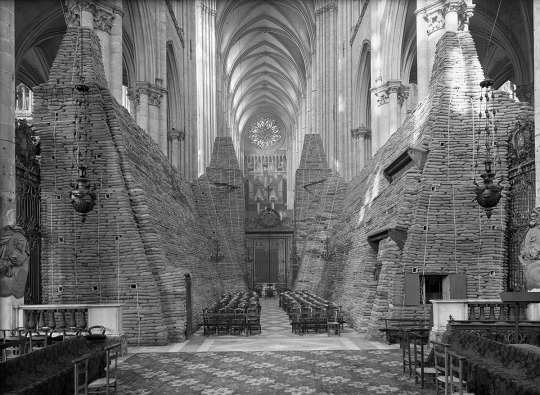Don't wanna be here? Send us removal request.
Text

Great Wall of China

Roman Aqueduct

Continuum Monument - Superstudio

Running fence - Christo and Jeanne - Claude
4 notes
·
View notes
Text
Yannis Xenakis

(sweep two rails...)
Iannis Xenakis was a Greek-French composer, music theorist, architect, and engineer. After 1947, he fled Greece, becoming a naturalized citizen of France. He is considered an important post-World War II composer whose works helped revolutionize 20th century classical music.
Xenakis pioneered the use of mathematical models in music such as applications of set theory, stochastic processes and game theory and was also an important influence on the development of electronic and computer music. He integrated music with architecture, designing music for pre-existing spaces, and designing spaces to be integrated with specific music compositions and performances.
Among his most important works are Metastaseis (1953–54) for orchestra, which introduced independent parts for every musician of the orchestra; percussion works such as Psappha (1975) and Pléïades (1979); compositions that introduced spatialization by dispersing musicians among the audience, such as Terretektorh (1966); electronic works created using Xenakis's UPIC system; and the massive multimedia performances Xenakis called polytopes. Among the numerous theoretical writings he authored, the book Formalized Music: Thought and Mathematics in Composition (French edition 1963, English translation 1971) is regarded as one of his most important. As an architect, Xenakis is primarily known for his early work under Le Corbusier: the Sainte Marie de La Tourette, on which the two architects collaborated, and the Philips Pavilion at Expo 58, which Xenakis designed by himself.
Fusing the ancient greek terms “poly�� (“many”) and “topos” (“place”), Greek-French composer Iannis Xenakis coined a neologism for his set of spatial creations that mixed together sound, light, color and architecture during live performances. The Polytopes may be considered a summa of Xenakis interests and skills, because his formation and experiences made him a prolific composer in the realm of music and in architecture.
Sources: http://socks-studio.com and Wikipedia
youtube
6 notes
·
View notes
Text
Аэлита
A Soviet constructivist movie, by Jakov Aleksandrovič Protazanov, 1924 (from a sci-fi novel written by Aleksej Nikolaevič Tolstoj, 1922 )




2 notes
·
View notes
Text
Space Station through Sci-Fi Optimization

Rick Guidice, early ‘60
“The work shown here represents a lifelong creative pursuit. This site catalogues illustration work done from the 1960's through the 80's for the advertising field , NASA and Atari , as well as the building design projects, residential and commercial, that have been my main focus from the 80's until now.” http://www.rickguidice.com/

2001, a Space Odyssey - Stanley Kubrick, 1968

Solaris - Andrej Tarkovskij, 1972

Interstellar - Christopher Nolan, 2014

3D Lunar Habitation - Norman Foster + Partners
#space#2001: A Space Odyssey#solaris#interstellar#cinema#architecture#movie#movie quotes#rick guidice
1 note
·
View note
Text
exodus, or the voluntary prisoners of architecture: exhausted fugitives led to reception

koohlas, zenghelis, vriesendorp 1972
0 notes
Text
2001


1 note
·
View note
Text
Soundtracks for the blind

1 note
·
View note
Text
Berenice Abbot Science photography





1 note
·
View note
Photo

The Deconstructed Bell
68 notes
·
View notes
Photo

The orbits of Mercury, Venus, Earth, and Mars, illustrated in The Beauty of the Heavens: A Pictorial Display of the Astronomical Phenomena of the Universe, 1842, by Charles F. Blunt.
1K notes
·
View notes
Photo

Les cathédrales d’Amiens et de Toulouse durant la seconde guerre mondiale
1K notes
·
View notes
Text
Caduta dei Gravi

Franco Purini


Foro Italico / Palestra del Duce - Luigi Moretti
0 notes
Text
Strada Novissima

0 notes
Text
Sub Limen

Mies Van der Rohe's Farnsworth House flooded
eaten by the nature
2 notes
·
View notes


